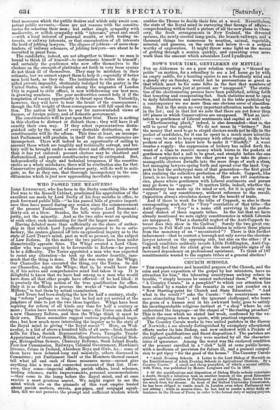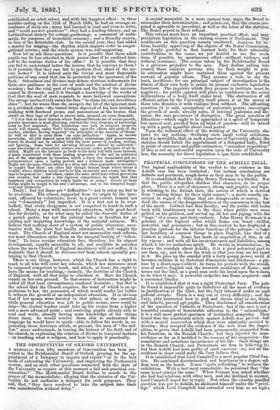CHURCH SCHOOLS.
" TRE comprehensive and beautiful prayers of the Church, and the calm and pure exposition of the gospel by her ministers, have no attraction for him," the labouring countryman seeking solace in trouble, " simply because he cannot understand them." So writes "A Country Curate," in a pamphlet* to which our attention has been called by a reader of the remarks in our last number on a " New Starting-point for Church and State Education." " And what is the result ? " asks the Curate : " the countryman seeks more stimulating food"; and the ignorant clodhopper, who bears the germ of a human soul in his awkward body, goes to satisfy his inextinguishable religious instinct at " a shop " where he can understand the language—at the chapel of "the ranting preacher." This is the case which we stated last week, confirmed by the ex- cellent clergyman whom we quote, with practical experience.
The Country Curate works in two united parishes in the diocese of Norwich ; a see already distinguished by exemplary educational efforts under its late Bishop, and now endowed with a Prelate of the highest qualifications and finest disposition.t The parishes are strictly agricultural; and they were marked by all the character- istics of ignorance. Among the worst was the enslaved condition of the peasant enrolled in a " club " held at some publiolouse, with a modicum of provision for future ill, and a present compul- sion to get tipsy "for the good of the house." The Country Curate
* "Adult Evening Schools. A Letter to the Lord Bishop of Norwich on the Establishment of Adult Evening Schools in Agricultural Districts. By a Country Curate." A small and cheap pamphlet, of which a second edition, with Notes, was published by Messrs. Longman and Co. in 1850.
Of the qualifications and disposition of Bishop Hinds nobody entertains a doubt, though a laborious task on another branch of the great Education question, and his position in Parliament as junior Bishop, have drawn him too much from his diocese. As head of the Oxford University Commission, he has been obliged to reside much in London even when Parliament was not sitting ; while in session-time, he has had to render a strict daily at- tendance in the House of Peers, in order to the formal duty of saying prayers.
established an adult school, and with the happiest effect : in three months ending on the 12th of March 1850, he had an average at- tendance of sixty-six ; many had learned to read and even to write, and "could answer questions"; they had a lending library, and an horticultural society for cottage-gardening; a command of arith- metic, for purposes of household economy ; and a friendly society, in lieu of the detestable club. In the second year, they had added a master for singing—the rhythm which imparts order to congre- gational service ; and the whole system was self-supporting.
Now let us ask three questions. Is it possible that these adult pupils can be less attached to their pastor than if he confined him- self to the routine duties of his office ? Is it possible that they can fail to understand better the lessons that he conveys to them ? Is it possible that they can fail to perform their share of the ser- vice better ? It is indeed only the trivial and most disputable portions of any creed that can be protected by the ignorance of the flock. Schoolmen and divines may debate abstruse refinements for their own guidance in the cure of souls and the conduct of divine worship ; but the vital part of religion and the life of the universe cannot be divorced ; and it is through a knowledge of the works of God that the soul of man expands to more hallowed conceptions. The savage instinctively raises his face " to claim his own hereditary skies " • but far worse than the savage's the lot of the ignorant man in a civilized state—the tamed brute deprived of his best instincts, walking with forehead prone, and unconscious as the brutes that crawl on four legs of what is above him, around, or even beneath. " I fear that in most districts where National Schools are of recent growth, popular ignorance is most alarming, and that the very elements of knowledge must be first imparted. This foundation once laid, in religious progress, much will depend, under God's blessing, upon the efforts and piety of the teacher, whether, having imparted the principles of the doctrine of Christ,' he will be able to carry them on unto perfection.' Again, in secular knowledge, all will depend upon his ability, enthusiasm, and perseverance. Surely he should not be satisfied with the mere power of reading, writing, and figuring. Some taste for elevating literature should be cultivated— some knowledge of elementary science conveyed—some principles of art in- stilled. Might not the labourer go forth to his daily toil with more interest, if made acquainted with those leading properties of the soil he cultivates and of the atmosphere he breathes, which a Davy has enunciated and ex- perimentafized upon, a Liebig proved, and a Johnson made intelligible ? Might not the man, where labour is a drug and where population is excessive, be taught that there are other fair though distant lands where labour is wealth, where children would not be to him an anxiety and a bane, but bless- ings to be prayed for ; and where, under the same strict laws which govern his own country, but under a less rigorous oompetition, he might find that happiness and competency he vainly fights for at home ? Surely all these things might be taught to his soul's advantage, and to his temporal happi- ness and prosperity." Truly ; but yet there are " difficulties "—not to estop us, but to be overcome. The school, supported from its origin by the igno- rant, officered by volunteers, must, to a great extent, remain not only " elementary " but imperfect. It is a fact not to be over- looked, that every clergyman is not competent to teach in such a school. Many a man with university education, with good facul- ties for divinity, or for what may be called the domestic duties of a parish pastor, has not the natural tastes or faculties for ac- quiring and imparting knowledge of the material sciences. We believe that nothing short of a system of public education, coex- tensive with the state but locally administered, will supply the want. The Church of England mast not monopolize such schools, nor must Dissenters enter them on the unequal footing of "tolera- tion." To leave secular education free, therefore, for its utmost development, equally accessible to all, and available in parishes where the mere Church of England machinery will not suffice, it is desirable that it should be disconnected from schools specially per- taining to that Church.
There is one thing, however, which the Church has a right to teach to all who will enter her schools, which her ministers must- be supposed competent to teach, and which, at least, she ought to have the means for teaching,—namely, the doctrine of the Church of England, with all that helps to elucidate it. Here the Church stands on her own ground. To that course of instruction might be added all that local circumstances rendered desirable ; but that is the school that the Church requires, the want of which is an op- probrium to her, the possession of which would render her bolder to witness the growth of an independent education. It is obvious that if her means were devoted to that school, as the essential, while general edircation was left to public means, more could be done—the clerical teacher could take up his course from a higher and a more advanced point ; and receiving pupils already able to read and write, already having some knowledge of the things about them, he would receive them able to understand the language he would have to speak—able to follow his words in ex- pounding those doctrines which, at present, the man of " the mil- lion" never understands, in tracing the history of his faith and of his church, in explaining the relation of divine to temporal matters —in teaching what is religion, and how to apply it practically.



























 Previous page
Previous page